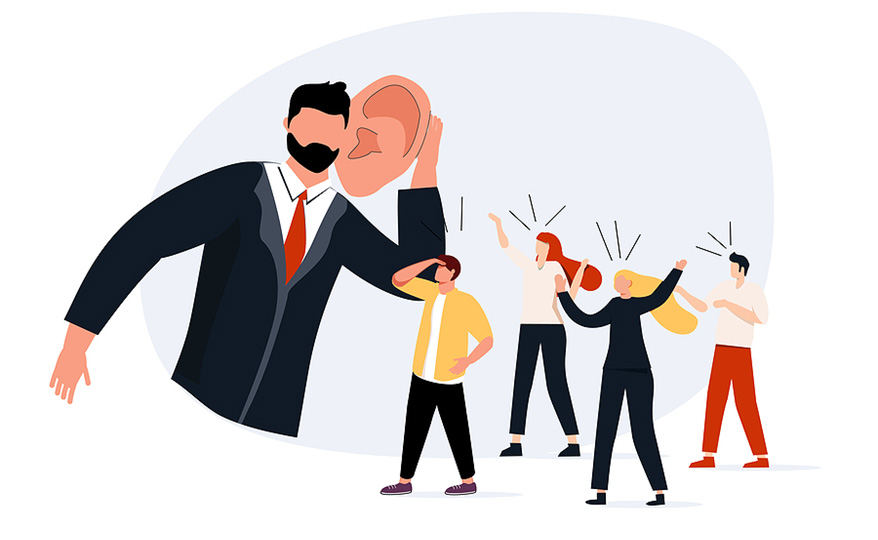Written by Sean McPheat | 

We often get asked on our Sales Training how to improve listening skills? They want the golden ticket, the one thing that will mean the million-pound deal, the loyal customer, the added business.
Naturally, there isn’t just one skill that will be the ‘holy grail’; various things make up the top salesperson’s abilities to get results. If there was one thing, though, that would make the biggest difference in the skills armoury of the salesperson, it would probably be the ability to listen effectively.
Listening is a vastly under-rated skill, one that is bypassed in many sales programmes, or glossed over as one part of the overall communication skills we all must adopt.
However, for many reasons, it is the key to opening the door to sales, as it can set you apart from the plethora of salespeople who concentrate more on their product push than on actively getting the knowledge they require to know exactly what to push.
The way to become a better listener is to practice “active listening.”

Active listening is where you make a conscious effort to hear not only the words that another person is saying but, more importantly, try to understand the complete message being sent.
To do this, you must pay attention to the other person very carefully.
You cannot allow yourself to become distracted by whatever else may be going on around you, or by forming counter arguments that you’ll make when the other person stops speaking. Nor can you allow yourself to get bored and lose focus on what the other person is saying. All of these contribute to a lack of listening and understanding.
If you’re finding it particularly difficult to concentrate on what someone is saying, try repeating their words mentally as they say them – this will reinforce their message and help you stay focused.
To enhance your listening skills, you need to let the other person know that you are listening to what they are saying and that’s if you are cold calling or face to face with a prospect.
To understand the importance of this, ask yourself if you’ve ever been engaged in a conversation when you wondered if the other person was listening to what you were saying. You wonder if your message is getting across, or if it’s even worthwhile continuing to speak. It feels like talking to a brick wall and it’s something you want to avoid.
You should also try to respond to the speaker in a way that will both encourage them to continue speaking, so that you can get the information if you need. While nodding says you’re interested, an occasional question or comment to recap what has been said communicates that you understand the message.
– They practice listening skills
– They keep an open, curious mind
– They link what they listen to with what they already know
– They find areas of common interest
– They resist external distractions
– They ask questions to clarify understanding
– They summarise often
– They analyse non-verbal signals
– They listen to content and emotion
I would say the most important item in that list is to ‘practice’ the skill of listening.
The truth is you will never become perfect, but you can always improve and get better at this fundamental but vastly important skill that will make you so different to your competitor who is more interested in pitching than learning. Many have a fear of cold calling because they feel that their overall communication and listening skills are not up to scratch – it’s most likely their of rejection but if you don’t have the skills you are not going to feel confident.

It’s often said that you never learn anything when you’re talking, only when you’re listening. How true is that statement!
But we often meet people who are poor listeners. They interrupt, they are full of their own self-opinionated ideas, they love the sound of their own voice, and they seldom allow you to get a word in.
Know who I mean? We even get some on our Telesales Training programmes – the know it all.
Listening is a skill that can be developed. Yes, it’s a skill, which means it can be improved, built on and enriched. Ever feel that you could do with listening a bit better?
Here are 10 ways you can improve your listening skills:
Practice your listening skills.
This seems obvious but listening improves with practice. When you’re watching TV or even listening to two people having a discussion in front of you, practice real listening. Imagine someone gave you a test after the conversation and asked you to sum up the main points. Would you be able to?
Stay curious.
You need to be inquisitive rather than judgemental. Ask yourself why the other person has that opinion. Especially if their ideas differ from yours, you should wonder why they think that way.
Link what people say to what you already know.
Memory is all about association, so think how what they have said links up with your current knowledge. Does it add some value? Does it fill in any gaps? Does it act as a contrast to what you already know? By listening attentively, you build up a real storehouse of information, even it contradicts what you already believe.
Find areas of common interest.
Is there a way you can link what they are saying to something you have an interest in as well? Maybe you both know similar people. Maybe you lived in the same area a few years back. This commonality breeds security and builds rapport between people.
Try to resist external distractions.
I say ‘try’ because this is a hard one. If it’s a noisy room, block out the noise by concentrating hard on what they are saying. Focus on them rather than what others around are saying. The speaker will appreciate your interest.
Ask questions to clarify understanding.
If what they’re saying is too general or they have missed out important details, ask for clarification and allow the person to fill in the details. If you use guesswork or only think you know what they mean but are unsure, you cause confusion to reign supreme!
Summarise often.
Just to make sure you are on the right wavelength as the speaker, summarise your understanding of what they have said so they can correct you or confirm you have understood perfectly.
Watch the non-verbal signals.
How a person says something often gives more of a message than what they say, so watch what they are doing with their hands, establish eye-contact and keep in tune with their whole-body language.
Listen to content and emotion.
Very often, we hear the words, but we don’t listen to the emotions that come with them. By identifying how people feel about something, you get more than just part of the message, so be interested in how the message is coming across too.
Listen to understand, not necessarily agree.
Stephen Covey said that most people listen with the intent to reply. What we should do is attempt to understand their meaning. It doesn’t mean you agree with them; you simply see what their perception is, you wonder why they feel that way and you have a clearer view of why they have that opinion.
Having followed these ideas of how to improve your listening, you then earn the right to share your views and hopefully the other person will learn from your good listening skills how they should listen too.
You never know, you might affect how many of your products they buy from you too.
And remember; no-one ever got sacked for listening too much.
Listening is just one of the key skills needed to be successful in sales. Why don’t you benchmark yourself against what excellence looks like in your role by taking a Sales Assessment. You will receive a personalised report of your strengths and weaknesses.
Improve your skills further by attending our 2-day Sales Skills Training masterclass. You’ll attend with people from other organisations and learn from them as well. It’s a fun, practical course which is accredited by the ISM who are responsible for creating Sales Qualifications within the UK.
Remember to take a look at our popular portfolio of Sales Training Courses.
Happy Selling!
Sean

Sean McPheat
Managing Director
MTD Sales Training
Updated on: 18 February, 2016
Related Articles

Search For More
